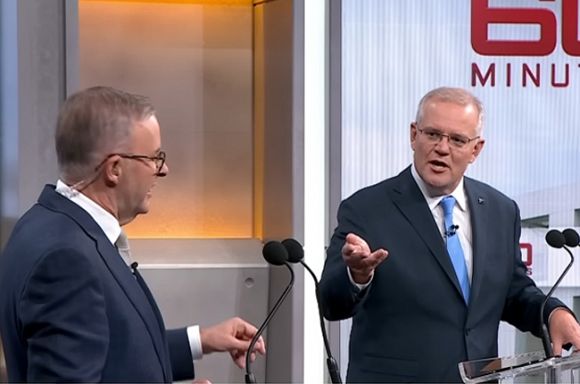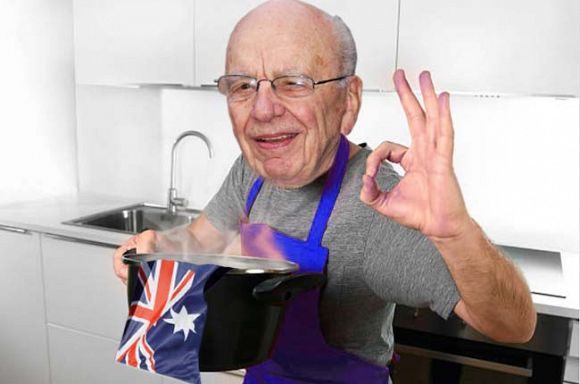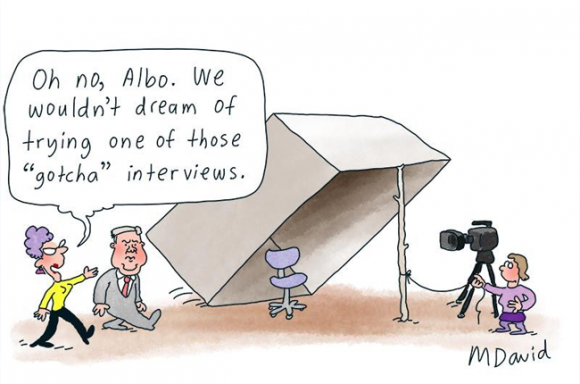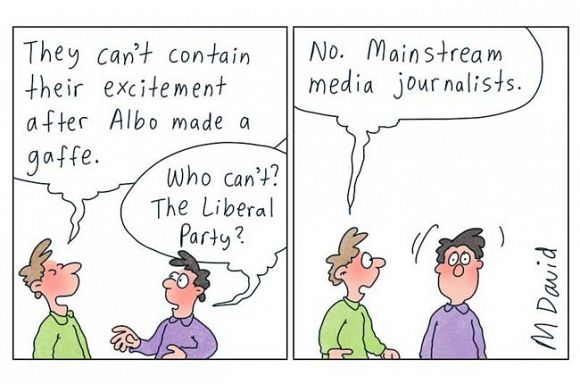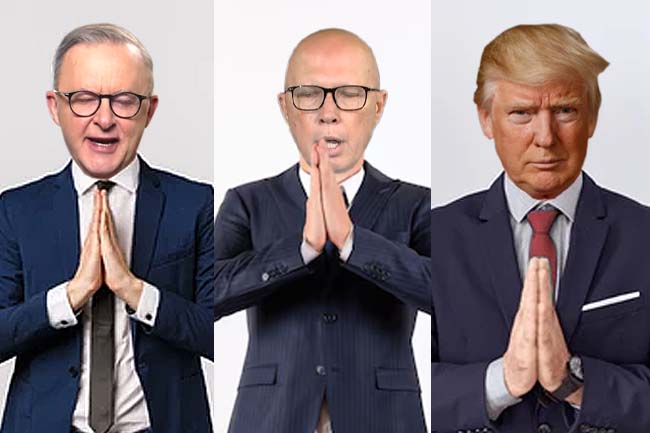The covering up of corruption and scandals by the mainstream media is highlighting the importance of independent journalism more than ever, writes Paul Begley.
PRIME MINISTER Scott Morrison’s somewhat crude pitch to Australian voters is that during uncertain times, it would be foolish to risk adding to existing uncertainty by changing government, regardless of the standing of the Government’s leadership and performance under his watch.
That pitch includes forgiving the base quality of his ministers past and present, many of whom are either plainly incompetent, corrupt or both.
Two of them, Christian Porter and Alan Tudge, are sidelined without portfolio responsibilities on account of behavioural transgressions for which they are not otherwise held accountable. Porter abandoned his defamation suite dedicated to establishing his unsullied innocence, but the PM declared him innocent anyway before stripping him of his ministry.
Tudge is still Education Minister in name but is not permitted to speak or be seen publicly before 22 May, though is still expected to somehow hold his seat. Senators Richard Colbeck and Linda Reynolds are nowhere to be found because anything they might say could be held against them on aged care and Brittany Higgins respectively.
Assistant Minister Tim Wilson turned up to a town hall in glorious Goldstein and shouted at his audience for failing to appreciate that he is a very important person. Other ministers are declining invitations to show up at electoral town hall meetings, and by so doing invite mischievous rival candidates to drop their nameplates onto empty chairs.
The Morrison certainty narrative is to be expected from a government on the ropes and would not usually be accepted at face value. But in the 2022 election campaign, it’s a narrative that an obliging mainstream media has largely accepted as a safe default premise to which many journalists return when press conferences are being held, interviews are being conducted or copy is being filed.
To that malaise can be added the non-reporting of media stories that defy the Morrison narrative, together with the magnification of stories that support the notion that an alternative government of any stripe is problematic and its pretenders must be put under a microscopic torch from which Morrison and his ministers are spared.
The transparency of media partisanship has some independent commentators taking the view that the surrender of the Australian political media is the main story of the campaign. That view is further compounded by one of the central election issues being government integrity, prompted by calls for Morrison to honour his 2019 promise to establish a federal anti-corruption commission, a promise he is understandably reluctant to fulfil.
Mr Morrison protests that a NSW ICAC model would amount to a kangaroo court that drives out of office good leaders like the popular Gladys Berejiklian. He sticks stubbornly to that view despite the fact that when she knew she was being investigated, the former NSW Premier decided to resign without being pushed out of office by anyone.
Morrison’s talking points on the matter are recited dutifully and disseminated through media outlets largely without context. It’s not as though context is hard to find and might include a point made in a 2018 Sydney Morning Herald story by legal affairs writer Michaela Whitbourn. She cited the then head of NSW ICAC, David Ipp QC, who argued that corrupt politicians like Eddie Obeid and Ian Macdonald would be free men under the soft anti-corruption model proposed by Morrison.
Either journalists in the main mastheads and electronic outlets are not aware of any context that would contest the Morrison premise, or they are instructed by editors and producers to limit their reporting to events that are happening, without editorialising about them or looking in rearview mirrors.
They should act purely as stenographers reporting what the Prime Minister says, regardless of his documented history here and abroad as a compulsive and serial liar.
The election campaign has been in unofficial operational mode for many months prior to the election date being called. During that time, a standard media practice has become established and it’s one in which negative stories about Labor are magnified while negative stories about the Morrison Government get minimal coverage or are not reported at all.
A recent example of the latter was a bizarre incident in which the PM answered a journalist's question by calling her “Mr Speaker” on three occasions. A minor slip? A major brain fade? A loss of plot or a loss of bearings? We will never know. It was reported by Yahoo News, the Daily Mail and The Guardian, but for voters relying on the mainstream media, it didn’t happen.
The ABC ran the PM’s answer but took the trouble to edit out the “Mr Speaker” bloops. If it indicates a mental health question mark hanging over the man ostensibly running the country, voters remain in the dark.
Other examples include the non-reporting of a Four Corners account about runaway incompetence and corruption involved in the awarding of $1.1 billion of contracts to Aspen Medical, an L-NP donor company. Aspen was neither qualified to apply for nor able to competently fulfil the terms of the contracts it signed up to and for which it was handsomely remunerated.
Lives have been lost and corruption allegations connected to the company include large scale money laundering. The scandalous story was put to air on the Monday of week three of the campaign but was not picked up by any of the major mastheads. Like the “Mr Speaker” bloops, it vanished into a void. It didn’t happen.
Apart from self-censorship, is the matter of media uncritically accepting a contentious government premise. Towards the end of the third campaign week, another L-NP donor company, Lark Distillery, was visited by the PM who announced it was the recipient of a $4.5 million taxpayer grant to enable it to build another distillery.
Lark is a highly profitable listed company that produces whiskey. The campaign press pack attended that announcement and largely reported it as a good news story demonstrating the Morrison Government’s admirable support for business development.
No journalist asked why the company did not raise the money by more standard business means, such as negotiating a bank loan, or why it deserved to be the beneficiary of taxpayer largesse, which would be the usual way such a story would be treated by a media pack trained to exercise the core journalist skills of objectivity and scepticism. With a company such as Lark, the unstated narrative meekly accepted by the media appeared to be “if you have a go, you get a go” to the tune of $4.5 million.
It was also perhaps another example of the PM “not being into the politics of envy”, an excuse he made when L-NP donor Harvey Norman was not asked to refund $22 million of taxpayer labour subsidy money it had been gifted but had not earned. Why waste good money on the undeserving poor who aren’t fully covered by insurance against fire or floods, when it can be used to shore up the support of a donor?
Perhaps the most striking case of self-censorship followed the recent revelation by Jordan Shanks on his FriendlyJordies YouTube channel of a leaked report on the Prime Minister’s investigation of issues surrounding the “desk wanker” episode in the Parliament House prayer room, as reported by Channel 10 during March 2021.
The PM clearly wanted to bury the incident and was determined to keep the report secret once the investigation was conducted. But someone leaked it to Shanks.
One overly simple explanation for the media silence is perhaps that the press pack consist of many young journalists covering the Election who have only known a Coalition Government and are uncomfortable about seeing change that might not be to their benefit, especially as Morrison’s PR people have courted ambitious and starry-eyed young journalists looking for access to the seat of power.
They get highly sought-after invitations to drinks with the PM and even a fun night out at a bowling alley, all on the taxpayer.
In the end, what is known is that the mainstream media has surrendered its role of holding the Government to account. Also known is that as belief in the Fourth Estate to perform its role as a good-faith messenger is further diminished, confidence in Australia’s traditional institutions is being struck another blow.
In the interim, reliance on independent media and social media as sources of trusted news is gaining strength. The accompanying abandonment of the major parties by voters in support of independent candidates with sound traditional credentials may ironically be an outcome of the same media trying in vain to discredit them.
Things being what they are, the mainstream media will continue to prop up Morrison’s re-election narrative that supports a strategy that can be crudely summarised in these few words: The certainty of a Morrison Government that has been blatantly uncaring, incompetent and corrupt for the past three years, is better than the uncertainty of its alternative.
Whether that narrative prevails on 21 May remains to be seen.
Paul Begley has worked for many years in public affairs roles, until recently as General Manager of Government and Media Relations with the Australian HR Institute. You can follow Paul on Twitter @yelgeb.
Related Articles
- FLASHBACK 2019: How many seats will the Coalition win when the truth is actually told?
- Let Scotty shout through a debate on a fairer playing field
- Mainstream journalists are selling their souls for the dollar
- Murdoch bias is boiling Australian democracy
- Now is a crucial time for journalists we can trust
 This work is licensed under a Creative Commons Attribution-NonCommercial-NoDerivs 3.0 Australia License
This work is licensed under a Creative Commons Attribution-NonCommercial-NoDerivs 3.0 Australia License
Support independent journalism Subscribe to IA.




